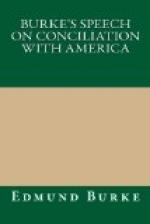Only a few months elapsed, however, when the question of taxing the colonies was revived. Pitt lay ill, and could take no part in the proposed measure. Through the influence of other members of his party,—notably Townshend,—a series of acts were passed, imposing duties on several exports to America. This was followed by a suspension of the New York Assembly, because it had disregarded instructions in the matter of supplies for the troops. The colonists were furious. Matters went from bad to worse. To withdraw as far as possible without yielding the principle at stake, the duties on all the exports mentioned in the bill were removed, except that on tea. But it was precisely the principle for which the colonists were contending. They were not in the humor for compromise, when they believed their freedom was endangered, and the strength and determination of their resistance found a climax in the Boston Tea Party.
In the meantime, Lord North, who was absolutely obedient to the king, had become prime minister. Five bills were prepared, the tenor of which, it was thought, would overawe the colonists. Of these, the Boston Port Bill and the Regulating Act are perhaps the most famous, though the ultimate tendency of all was blindly coercive.
While the king and his friends were busy with these, the opposition proposed an unconditional repeal of the Tea Act. The bill was introduced only to be overwhelmingly defeated by the same Parliament that passed the five measures of Lord North.
In America, the effect of these proceedings was such as might have been expected by thinking men. The colonies were as a unit in their support of Massachusetts. The Regulating Act was set at defiance, public officers in the king’s service were forced to resign, town meetings were held, and preparations for war were begun in dead earnest. To avert this, some of England’s greatest statesmen—Pitt among the number—asked for a reconsideration. On February the first, 1775, a bill was introduced, which would have gone far toward bringing peace. One month later, Burke delivered his speech on Conciliation with the Colonies.
EDMUND BURKE
There is nothing unusual in Burke’s early life. He was born in Dublin, Ireland, in 1729. His father was a successful lawyer and a Protestant, his mother, a Catholic. At the age of twelve, he became a pupil of Abraham Shackleton, a Quaker, who had been teaching some fifteen years at Ballitore, a small town thirty miles from Dublin. In after years Burke was always pleased to speak of his old friend in the kindest way: “If I am anything,” he declares, “it is the education I had there that has made me so.” And again at Shackleton’s death, when Burke was near the zenith of his fame and popularity, he writes: “I had a true honor and affection for that excellent man. I feel something like a satisfaction in the midst of my concern, that I was fortunate enough to have him under my roof before his departure.” It can hardly be doubted that the old Quaker schoolmaster succeeded with his pupil who was already so favorably inclined, and it is more than probable that the daily example of one who lived out his precepts was strong in its influence upon a young and generous mind.




